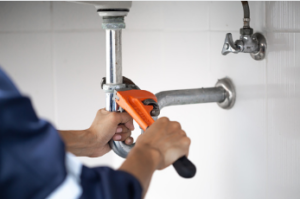Plumbers install, repair, and maintain pipes transporting water, waste, and gas throughout buildings. They also install plumbing fixtures and appliances.
 Plumbers typically work on commercial, industrial, and residential properties. Their duties may include inspecting and testing existing systems and diagnosing problems. They may also be involved in designing and drafting blueprints to make the installation process more efficient.
Plumbers typically work on commercial, industrial, and residential properties. Their duties may include inspecting and testing existing systems and diagnosing problems. They may also be involved in designing and drafting blueprints to make the installation process more efficient.
Job Duties
Plumbers work on a variety of projects in both residential and commercial settings. Their duties include installing, repairing, and maintaining water, drainage and waste disposal pipes.
Plumbing can be a challenging career, but it also offers a rewarding job. You can use your problem-solving skills to meet with clients and help them improve their homes.
You can specialise in residential or commercial plumbing or work for a company that does both. In a commercial setting, your duties include installing and repairing water distribution pipes in office buildings and retail shops.
As a plumber Gawler, you work with different pipe materials such as copper, PVC and galvanised pipe. You use various soldering, welding and brazing tools to join the lines.
The job duties of a plumber involve reading blueprints and other construction plans to ensure that the plumbing systems in a building are installed correctly. They also inspect the facility to determine any problems with the plumbing and ensure the building is up to code.
A plumber Gawler can also use a vacuum plunger to unblock clogged sewer lines and install drain traps and other water-draining systems. They can also install a garbage disposal system and repair leaky sinks and faucets.
Most plumbers have a high school diploma and receive on-the-job training from their employers. They must also pass a series of exams to become licensed. A license is required in most states and counties to work as a plumber independently.
Education and Training Requirements
Plumbers are a necessary part of many industries and work to maintain water supply and waste systems in residential and commercial buildings. They are highly technical professionals who often rely on their knowledge of various mathematical concepts to perform their jobs.
A high school diploma or GED certificate is the minimum education requirement for a career as a plumber. Some states also require a technical course, which may be completed in high school or through a trade school training program.
Most apprenticeships are run through local trade schools, businesses and union chapters. Employers typically pay apprentices while they learn the skills they need to become a plumber.
Upon completing the apprenticeship, plumbing workers must complete a series of licensing exams to receive certification. These tests test knowledge of the plumbing industry and its rules and regulations. They cover four subject areas: piping, plumbing fixtures, drainage and waste management, and construction.
Once a plumber has passed their exams, they can work independently on plumbing jobs. However, to protect themselves and their customers, plumbers must be licensed in their state before working on a job.
Some states offer reciprocity for plumbers who have successfully worked in another state and passed a similar testing program. If so, this may save you the time and cost of obtaining your license in multiple states.
Work Environment
A plumber is responsible for many jobs, such as installing water lines in buildings and fixing leaks or clogged pipes. Some are involved with residential plumbing, while others work in commercial settings such as schools, hospitals and factories.
Most plumbers work full-time and are required to be available for emergencies. They usually travel to different job sites daily and may spend extended periods outside. They are also exposed to various contaminants and minor injuries due to their job requirements.
Some plumbers are self-employed, allowing them to set their hours and work in locations they prefer. They can also set their schedules for evening and weekend work.
The work environment for a plumber is often harsh and physical, with heavy equipment required to complete the job. In addition, plumbers are frequently subject to unpleasant weather conditions, including rain and snow.
Occupational hazards include exposure to mould, which can be harmful when inhaled or touched. Also, plumbers work in confined spaces and must wear safety equipment and gloves.
Education and Training: Most plumbers train through an apprenticeship program combining classroom instruction with paid on-the-job training. These programs typically last four or five years and teach the fundamental technical skills needed to become a plumber.
Employment Outlook: Over the next decade, employment of plumbers is expected to grow 2 per cent, slower than the average for all occupations. However, demand for this occupation is projected to increase as more construction projects are completed.
A plumber must be able to read and understand blueprints and building plans and perform tasks requiring mechanical knowledge. They also ensure all pipes and fixtures meet health codes and other regulations.
They must also be familiar with specialised tools and materials used in the industry. In addition, they must be able to analyse information and make recommendations on how to solve problems.